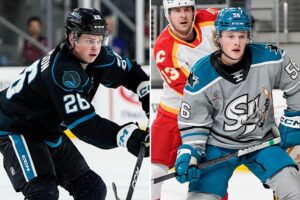by Mike Peck || AHL On The Beat Archive
There are no more long bus rides.
Three games in three nights aren’t on their schedule anymore.
Interstate 90 commutes between Rockford and Chicago are non-existent as well.
Life is a little different in 2010-11 for Bryan Bickell, Corey Crawford, Jake Dowell and Jack Skille. The distance between the Rockford MetroCentre and the United Center is about 90 miles and on a good day it takes about 90 minutes to get between the two.
It took this quartet of players a lot longer than that to get to Chicago, but now that they are with the Blackhawks, they are all making the most of their opportunity.
Bickell, Crawford, Dowell and Skille represented the core of the Rockford IceHogs over the past three American Hockey League seasons. The four skaters helped Rockford reach the Calder Cup Playoffs in all three campaigns, just one of three teams in the Western Conference to accomplish that feat.
Combined, the four players played in 881 career AHL games, including 707 in Rockford before sticking with Blackhawks this season.
The path wasn’t always smooth, or even went in the same direction, but the end goal was all the same for them. Now they are making an impact in the National Hockey League.
From Buried In The System To Stanley Cup Champion
After skating in 48 AHL games with the Norfolk Admirals during his rookie season in 2006-07, Bryan Bickell received a late season recall to Chicago and finished out the regular season with the Blackhawks, notching two goals in his first three NHL three games.
A promising start for Bickell whose big body (6-4, 218-pounds) and booming shot helped make him Chicago’s second round draft pick (#41 overall) in the 2004 NHL Entry Draft. Bickell, however, would only play 18 games in Chicago before permanently sticking with the big club over the next three seasons. Bickell was recalled from Rockford on April 7, 2010 and hasn’t returned.
The development process for Bickell seemed to be progressing well during his second campaign in the AHL when he nearly doubled his goal output (10 to 19) and increased his overall point production from 25 to 39 points during his first season in Rockford.
But an injury-plagued third season limited Bickell to just 42 games in Rockford in 2008-09 and saw his point total dip to just 14 points. Not the most ideal season for a player whose entry-level contract was set to expire.
“Coming off my injuries, I knew that it was my contract year and the last handful of games, even in the playoffs, I needed to prove to the organization that I wanted to stay and one day make this team in Chicago,” said Bickell. “You need to look past the injuries and you never know in this game when the injuries are going to come.”
On New Year’s Eve 2008, Bickell broke his thumb in a fight with the Quad City Flames’ J.D. Watt and the Orono, Ont., native missed the next 29 contests. After playing in 10 games following his thumb injury, Bickell suffered another setback with an eye injury that forced him out of five more tilts.
With a system stocked in prospects, Bickell was in danger of falling off of the Blackhawks depth chart. Now the winger occasionally finds himself playing on a line with Jonathan Toews and Patrick Kane.
Despite the injuries and reduction in points, the Hawks re-upped with Bickell for another campaign in ’09-10 and the move has worked out well for both parties. The winger put up 31 points with the IceHogs in 64 games last year, but more importantly re-established himself in the organization.
“Only playing half the season two years ago then being up and down last year was tough,” said Bickell. “To be here fulltime now, I feel great and I’m glad those injuries are in the past. I proved to them last year I can play here and now I’m here and hopefully I can stay.”
Bickell played in 16 total games with Chicago in the regular season and four more in the club’s march to the Stanley Cup. A pretty drastic turnaround for a player that just one season earlier could have been buried in the system and not re-signed. To reward Bickell, Chicago signed him to a three-year contract in July.
“The waiting game and being more consistent was the toughest part,” replied Bickell. “I knew I could play here but the coaches and the management told me I needed to work on my consistency. It’s been coming around and as of late it’s the best it’s ever been for me.”
Nearly halfway through his first-full NHL season, Bickell ranks in the top 10 among all NHL rookies in points, goals and assists.
The Future Is The Present For Crawford
It’s key for goaltenders to have a short term memory. Tabbed as the goalie of the future for the Blackhawks by many after his second round selection (#52 overall) in the 2003 NHL Entry Draft, Corey Crawford had to wonder if the future would ever get here.
While honing his skills in the AHL, Crawford saw the likes of Patrick Lalime, Cristobal Huet, Antti Niemi and Marty Turco move into the organization and move ahead of him of the depth chart.
“My thought process was that, If I wasn’t here then I wasn’t good enough,” commented Crawford on his road to the NHL. “I had to work on my game. I was still playing a lot of games in the American Hockey League, which was really good. It was still fun to play hockey in that league, it’s a really good league.”
After five seasons in the Blackhawks organization Crawford made the team out of training camp for the first time in his career in 2010-11. Crawford has finally found an opportunity to step into and excel in the NHL.
It wasn’t that Crawford didn’t have the accolades in the AHL. The puck-stopper never had fewer than 22 wins in a season, had just one losing season in his career (22-23-1 during his rookie campaign in 2005-06) and is Rockford’s all-time winningest goalie.
“If you look at the four guys that are here from last season’s Rockford team, he probably had the toughest road,” said former IceHogs head coach and current Blackhawks assistant coach Mike Haviland. “He played the longest in the AHL and I think Crow really stayed focused. I know he had some ups and downs emotionally, but every player in the AHL has that.
“You get a taste of the NHL and you want to be here. It’s the guys who can re-focus and stay focused at the task at hand and what they have to work on to get out of that league. Crow certainly did it and he paid his dues and it was his turn. To see what he’s doing right now is outstanding.”
The Montreal native played just eight games with Chicago through his first five professional seasons and like all AHL prospects, had to deal with the tough mental part of the game.
Whether it was dealing with goalies brought in from outside of the organization or stuck in the middle of a salary cap crunch, Crawford stayed focused and has established himself as one of the top rookie goaltenders in the NHL this year.
“Sometimes you have doubts in your mind about making it,” said Crawford. “I was always a guy that tried to work hard and always get better. And that was a key for my success and being able to make that next step to this level and not giving up early.
“There are guys that I’ve seen that haven’t made the next step that had the skill, but weren’t strong enough mentally to make it to the next level.”
Like Bickell, Crawford is making waves during his first full NHL stint. Entering 2011, Crawford ranked in the top three among all NHL rookie goalies in wins, save percentage and goals against average.
Grit Not Flash Got Dowell To The Show
Fans don’t want to hear about fourth line prospects. In a world that craves the “next big thing” or “next super star”, it’s not easy being a fourth-line grinder and it’s even tougher gaining the appreciation of the fans.
Jake Dowell didn’t take the glitzy road to the NHL. Don’t look at the back of his hockey card to judge the type of player Dowell is. Although, he has found a bit of an offensive touch in the NHL.
“A lot of the things that I do are the kind of things that might go un-noticed,” said Dowell. “I’m not going to be the big goal scorer that is talked about or written about a whole lot. You don’t get a lot of the accolades being a role player. I had to do whatever I could to fill a role that was needed here.”
While at the University of Wisconsin, Dowell was put in more offensive roles compared to what he faced when he turned to the professional level. After scoring 19 goals as a senior with the Badgers, Dowell had 25 markers in his first three-full pro seasons.
Lighting lamps didn’t get Dowell to the NHL. It was his hard work and leadership that was his meal ticket to hockey’s top level.
The Blackhawks knew this and that is also why he was Rockford’s team captain in 2009-10. Dowell never notched more than 23 points in an AHL season and rarely, if ever, played above the third line. That’s why he was on the penalty kill during his first NHL game on Nov. 25, 2007 and he scored a shorthanded goal in his debut at Calgary.
“Those are the guys that you need around, they are the other pieces of the puzzle that make up championship teams,” said Haviland. “And Dowell falls in that category. He’s been a captain, he’s been a leader. I remember him back at prospects camp when he was still at Wisconsin and I loved him then. He’s a character guy that you want on your team and his teammates love him. And you understand why.”
While some players have a hard time adjusting to new roles at the professional level, Dowell knew what he had to do to make it to the NHL. Dowell follows in the footsteps of the likes of Colin Fraser and Adam Burish, key role players for the Blackhawks during their Stanley Cup Championship season last year.
Even though Dowell might have found his niche a little bit quicker than most other prospects, it still was a challenge for the centerman to reach Chicago.
“It was difficult and it took a few years up and down between Rockford and Chicago,” said Dowell. “It was something that I had to be persistent with and be consistent with my game, while continuing to improve my game.”
At the turn of the calendar, Dowell already had marked five goals to go along with 10 assists and was among the NHL rookie leaders in plus/minus.
Skille Settles Into His Role
Since Rockford joined the American Hockey League prior to the 2007-08 season, no prospect has been anticipated, built up, knocked down and then re-hyped than Jack Skille by fans and media type.
With a new team in a new league, it was only natural for IceHogs fans to hook onto Skille. A fairly local product (Madison, Wis.), a year removed from an NCAA national championship at the University of Wisconsin and a first-round draft pick (#7 overall) by Chicago in the 2005 NHL Entry Draft, Skille had the pedigree of a star in the making.
As a first-round pick, there are pressures felt that most other players don’t experience. First rounders, especially players selected in the top 10, are frequently burdened as franchise savers or changers. That’s a lot to ask of an 18 or 19-year-old kid.
“You look at the Chicago Blackhawks at the time that Jack was trying to get in, we had (Jonathan) Toews, (Patrick) Kane,(Marian) Hossa, (Patrick) Sharp and (Kris) Versteeg when he was here,” said Haviland. “Our top six or seven guys where high end guys. So all of sudden Jack had to find a niche that makes him an NHL player. It’s a matter of wanting to change your game to make it in the NHL.”
It was easy to understand Skille’s frustrations though. During his rookie campaign in 2007-08, the winger played in 16 games in the NHL and thought his NHL career was off the ground. But Skille played just eight contests in the NHL his second year and six last season.
Like Dowell and Bickell, Skille was stuck in the hockey version of purgatory in the salary cap era, getting shuttled back-and-forth between the Windy City and the Forest City last season between games in the NHL.
“Games wise it got lower and lower each season and it was really frustrating there for a while because I felt that I was more prepared than I had ever been to play at the NHL level,” said Skille. “So I think it just was a mental battle and that the confidence stayed up, kept faith in myself and this organization and I just showed up every night and played hard no matter which team I was playing for.”
Skille’s production increased all three seasons in the AHL. He boosted his goals, assists and points each year and didn’t let the off-the-ice questions effect his on the ice play.
“I may not have been mentally prepared when I first signed pro, but it was going to be a learning experience no matter when I started,” said Skille. “The college game is a lot different than the pro game and I’m glad that I had the time I had in Rockford to learn the pro game on and off the ice.
“There is a lot of pressure there because of my draft status, being drafted pretty high. Knowing that I had a lot to live up to and that’s a lot for a kid at the age of 19-years old when he turns pro to handle.”
It was clear that Skille had the skill and ability on the ice to make it as an NHLer. Unfortunately that’s only half of the battle. Maturing on-and-off the ice, dealing with the pressures from media, fans and people inside the hockey community are other obstacles for AHL prospects to overcome.
Add that to a lot of self imposed mind games players put on themselves when waiting for their opportunity in the NHL, like “am I the next to go up”, or “I feel like I’m ready for the next level”, and the pressures of being a pro are much greater than what prospects might face in college or juniors.
“You see things here and there, whether it’s on the internet or an article in the newspaper or whatever it might be that might be negative,” said Skille. “I think that it’s pretty easy when those things come along to get in your head and hurt your confidence a little bit. But that is part of the process.
“It’s different for every player and I don’t regret the way I went. I know other players made it right away, but I faced a lot of adversity throughout my career so far and I think I’m a lot more mature person for that.”
Dowell knew coming into the professional level that he would make it to the NHL as a role player. Skille, on the other hand, had to reinvent the type of player he was to get into the NHL.
“There was a lot of pressure, a lot of hype for him,” said Haviland. “A first rounder, gets sent to the minors and you try to find your way. Am I a goal scorer or a checker and you try to guide them along as a coach to which assets are going to help them to get into the NHL.”
During his first full season in Chicago, Skille has played anywhere from the first line to the fourth line and everywhere in between. At the turn of the calendar Skille had accounted for 14 points for Chicago and ranked third on the team in shots on goal.





































